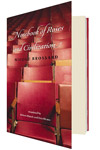The repeated phrase “i don’t stop reading/deliring” is an ecstatic mantra in Nicole Brossard’s Lovhers (Amantes), which is part of her pivotal trilogy of lesbian feminist work that includes These Our Mothers and Surfaces of Sense. This wordplay is pure Brossard, as Barbara Godard notes in the preface to her 1986 translation, the verb délire, meaning “to be delirious” or “to talk nonsense,” as well as dé-lire, the “unreading” or “unfixing of writing.” The pun could serve as the thesis behind the Quebecois poet’s career of more than four decades that has produced an oeuvre of more than thirty texts. Brossard groups her novels, poems, and essays under the title “fiction theory,” her version of l’écriture féminine, or the practice of writing the feminine body heralded by fellow poet-philosopher Hélène Cixous. Similarly to the way Cixous pays homage to writers like Clarice Lispector and Ingeborg Bachmann, Brossard features female characters who find delirious pleasure and arousal in literary foremothers such as Monique Wittig, Djuna Barnes, Virginia Woolf, and Adrienne Rich. (In Brossard’s recent novel Yesterday, at the Hotel Clarendon a character literally masturbates to a particularly hot Violette Leduc passage.)
In Brossard’s newest poetry collection, Notebook of Roses and Civilization, translated by Robert Majzels and Erin Mouré, who also translated Brossard’s Museum of Bone and Water, one finds lyrical descriptions of lesbian desire coupled with a continued meditation on language. Brossard conflates writing with lovemaking—“at the hour of bedsheets or ink”—the poems forming a grammar of desire, like a diagrammed body. She moves from “the thousand and one possibilities of the toe, the foot / the ankle / images in the subway glued to each other / faces pressed against the whys” to an underworld of the nocturnal populated by heroines with screaming bodies suffering from desire and nostalgia, suffused with loss. These poems focus on yesterday, on l’imparfait, that descriptive past tense: “the better to plunge / into the imperfect tense / of a grammar in the grip of speed / amidst its own fragments / of silence and nostalgia.” In “Smooth Horizon of the Verb Love,” Brossard evokes memories of a lesbian nightclub from her native Montreal in the ’80s: “gentle ways / to swoon in a corner with she who / put her tongue in my mouth.” The tongue is that which speaks, loves, silences. Words are tasted, savored, sometimes spit out—“yesterday again I thought of the word orange / the words cerise, olive, words we stick in our mouths / but skull was the word that surged up / then chalkscratch and childhood / then heart shoulder and knee no commas.” Like this instruction for punctuation, there are other lines about translation, a directive to “use the familiar.” But the translation Brossard is obsessed with here is of a different sort, the translation of bodily memories, resurrecting old loves. For Brossard words cover the wounds, “colours that precede / the iodine of words / torment of punctuation.”
But even as she celebrates language’s precision—“beware of words that blur,” she warns—these poems mourn language’s limitations, the impossibility of communication, the gaps that “questions and old silences” reveal. Dividing the collection are three “Soft Links,” stream-of-consciousness prose pieces and present-day reflections of the familiar Brossard author-narrator, some of the most vivid and, yes, delirious writing of the collection: “It’s written down with bruises, abundance of life burst to fullness in a world and its niches of worn paths that lick at the shadow of bones.”





